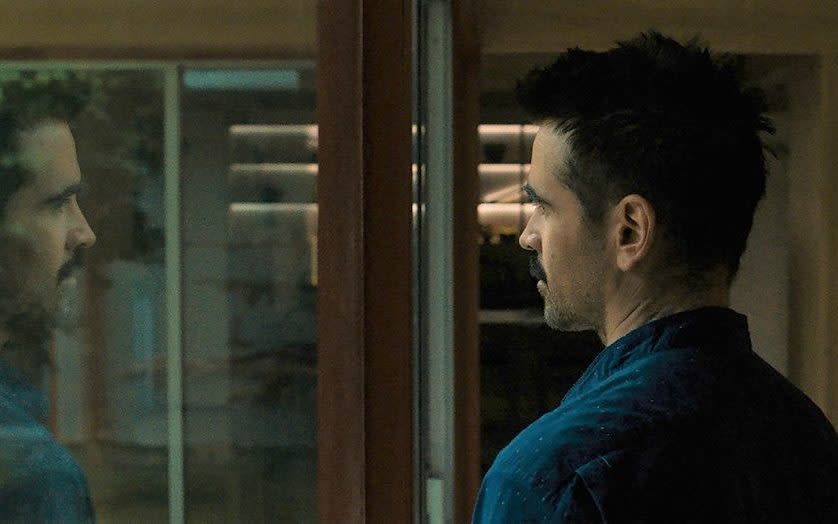After Yang, review: Colin Farrell adopts a robot child in thoughtfully melancholic style

Imagine a family of four in the not-too-distant future, three of them human. Tea artisan Jake (Colin Farrell) and his wife Kyra (Jodie Turner-Smith) have adopted their nine-year-old daughter Mika (newcomer Malea Emma Tjandrawidjaja) from China, and feel an older Asian sibling would help smooth over her formative years and let her understand her heritage better.
Their solution is Yang (Justin H Min), a robot companion or “techno-sapiens” who knows everything there is to know about, say, ancient Chinese trees, and imparts his wisdom in soothing, therapeutic tones. By design, he is a perfect older brother, at least until the moment he irreparably malfunctions, one evening, when the quartet are taking part in a coordinated dance-off against other families online.
This sequence, which enfolds the opening credits, is wonderfully bouncy, a pure, hyper-coloured helium rush, intended to contrast with the soulful, quietly philosophical film that follows. It’s all about memory and technology. Yang cannot be fixed, because a core malfunction is above the pay grade of the guys at the service centre, and Jake realises glumly that picking a refurbished model has got them in this mess.
His daughter is inconsolable, his wife distant and troubled. Their individual relationships with Yang somehow seem much more important in his absence than they did when he was around. But if our own memories are uploaded onto the cloud every time we take a phone snap, what might a defunct android’s salvaged RAM contain?
This is the second feature by Kogonada, the South Korean artist who made his debut with the pensive, wispy Columbus (2017), and is celebrated for his video essays about film aesthetics. His nom de plume is derived from Kogo Nada, a Japanese screenwriter most renowned for his collaborations with Ozu. There’s certainly an Ozu-ness to After Yang – especially in the framings of this family in their living space, a meticulously designed environment with tinted glass partitions opening onto an ornamental garden. Architecture’s in ordered harmony with nature. The film’s serene aura is very particular.
The premise comes from a short story by the writer Alexander Weinstein, Saying Goodbye to Yang, which Kogonada has used, not as a Black Mirror-esque prompt for upsetting pain or paranoia, but mainly as a springboard for his gentle melancholy. Partly thanks to the lonesome ambient score, you’ll often be reminded of downtime moments from Blade Runner, like Sean Young reminiscing about her implanted reveries. Do androids like Yang dream of electric butterflies? And was Yang happy? In a flashback, he softly replies to Jake that it’s not a question he’s really capable of answering.
Helpful robots in cinema tend to gain a creepy edge over time, undeniably true of Haley Joel Osment in A.I. Artificial Intelligence. But Min’s presence here is calm and slightly sorrowful, expressing matter-of-fact frustrations about not quite seeing the world like humans do.
“What makes someone Chinese?” is a question Yang admits to grappling with. Kogonada wants to explore Asian identity as a neglected aspect of overall human experience, and adds a further, interestingly provocative layer by including several clones in his story, who express disgruntlement about being mistrusted and subtly persecuted.
Yang’s consciousness is stored away on a chip, which can be accessed with the right hack, and a virtual-reality interface opens up to navigate through it. We float into his memory palace as if sailing towards distant galaxies, with each recording he logged taking the form of a star.
Farrell’s Jake gets so preoccupied with solving the mystery of Yang, he succumbs to a kind of cosmic drift out there. He and Turner-Smith, both compellingly understated, do a splendid job as a couple in tacit crisis, who seem to have lost tactility and marooned themselves without knowing how to fix it – you could say their relationship is another organism that’s conked out at the core. Haley Lu Richardson, one of the sweetest American stars of her generation, shines here too in an intriguingly unhappy supporting role, as an apparent friend of Yang’s who none of his family knew existed.
Kogonada is working with a lot of free-associative ambition in this, so you can forgive him for letting a few threads waft out of reach: the film loses track of Mika for a fair while in the middle, and we’re left wanting to know about her biological parents, perhaps as much as she does. There’s a poignant incompleteness to the film, which ends slightly before you expect, but goes out, as if to soften the blow, with a gorgeous original song by Mitski you’ll be humming all the way home.
It’s a real tea-drinker’s piece, wanting you to sit down and let its hushed insights, like some earthy infusion, linger on the palate. The incentive is strong to see it again – not immediately, perhaps, but just when it’s just starting to fade on you. The second time, the flavours here can only deepen and unfurl.
PG cert, 96 min. In cinemas from Friday

 Yahoo News
Yahoo News 
